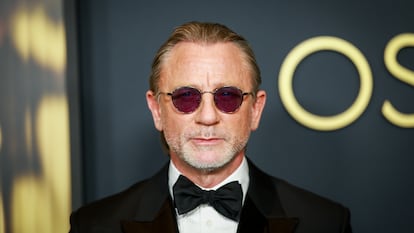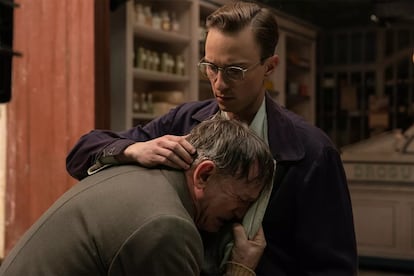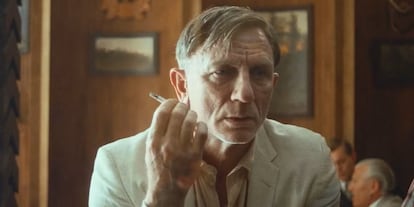Daniel Craig: “I wouldn’t have been able to star in ‘Queer’ during the years I was playing James Bond”
The English actor is nominated for a Golden Globe for his role as a heroin-addicted writer in Luca Guadagnino’s new film and is tipped to work again with the Italian director

Daniel Craig, 56, has never shied away from exploring the raw passion of the characters he portrays. In Love is the Devil (1998), he played a petty thief who becomes the lover of painter Francis Bacon. On stage at the National Theatre, he embodied the young Republican and Mormon lawyer Joe Pitt in Tony Kushner’s legendary Angels in America, capturing the character’s repression and fervent passion in his exchanges with Jewish civil servant Louis Ironson, as the play delved into the fears and desires of the gay community during the AIDS crisis.
Craig welcomes EL PAÍS in a luxurious London hotel suite, dressed in a blue linen shirt, cream trousers, and mother-of-pearl glasses, with his sandy-brown hair swept back. His initial responses are hard to catch as he seizes the chance to devour a sandwich handed to him by his assistant on a hectic day of promotional work. The occasion? Queer, the film adaptation of William S. Burroughs’ novel of the same name, a cornerstone of the American Beat Generation.
Directed by Italian filmmaker Luca Guadagnino, the movie explores the romance between William Lee, Burroughs’ disoriented, heroin-addicted alter ego played by Craig, and young Eugene Allerton (Drew Starkey) in 1950s Mexico. It also traces their descent into chaos as they experiment with the hallucinogen ayahuasca in the South American jungle. Guadagnino has described it as “the most gigantic gay film in history.”

“What I’m interested in as an actor is portraying the emotional lives of human beings. It would have been a failure of ours to show a relationship like the one in the film, and not represent their sexual life. The film is about the movie is about desire of two human beings for each other. The sexual scenes are probably the least interesting part of the film. Everybody’s doing it, thankfully, gloriously,” Craig says with a laugh.
For more than a decade, Craig embodied James Bond on screen, a role that has become a universal icon. He acknowledges that during this period, taking on roles like William Lee in Queer would have been challenging. “It would have felt like a reaction to Bond, as if I was trying to make a statement. It would have felt too self-conscious. Also, at that time, I was playing Bond — there is a world in which that exists, and I was very protective and aware of it,” he admits with genuine candor.
The road ahead
Like other actors who have played Bond — particularly Sean Connery — Craig tries as much as possible not to think too much about the challenge of moving beyond a legacy so towering it complicates building new, credible characters. “I’m not trying to impress anyone. I’m just going on with my career. I try and create things that I think have worth, and raise questions and debate. I’ve always approached things that way, even during the Bond films. I’ve always wanted to push boundaries and explore as much as possible. Hopefully, one could describe me as a creative person,” Craig reflects.
His raw, intense performance as William Lee in Queer has earned him a Golden Globe nomination for Best Actor. Future collaborations with Guadagnino are also on the horizon, including a potential project based on the DC comic book character Sergeant Rock — though Craig dismisses it for now as a rumor. “I’m a huge fan of Luca’s work. I’ve watched his movies avidly, and I’ve always been just impressed by the directions he wants to go in. He’s not tied to one style; he explores different styles. That’s what really excited me about working with him — the chance to work with someone so creative and interested in movies,” he says.
Craig is a global megastar trying to regain his footing after the whirlwind of being 007. “Nothing prepares you for that. Where do you go to for advice? There were only five Bonds before me. I spoke to Pierce Brosnan, and he just told me to enjoy it. I didn’t really enjoy the first film [Casino Royale]; I was a bit shaken by it. But I learned to enjoy it,” he recalls.

Part of Craig’s return after Bond involves taking bold creative risks, like his role in Queer. Another significant aspect is his return to the theater stage, where his career began. Reflecting on the state of the arts, Craig laments the dwindling budgets allocated to culture by many governments.
“They’ve been stripped of all resources. And it’s not just here — every country in Europe is stripping money from the arts because of austerity. Whether it’s the U.K., Spain, or Italy, our cultural identity is the most important thing we have. Every time a country conquers another, the first thing it does is take away its culture. Without it, we are nothing,” he passionately asserts. “I understand money is tight, but money shoveled into the arts is a really good investment. Look at me — I had a full scholarship to attend a drama college that no longer exists. Public scholarships like that don’t exist anymore. And I think I did okay, right?” he asks, a twinkle in his eyes.
James Bond is as emblematic of British identity as The Beatles or red telephone boxes. The U.K., however, has changed in recent years. Brexit has been largely to blame. “I love this country; it’s my home. But now everything’s gotten a bit tricky,” says Craig, his voice rising with passion, punctuated by more than one expletive — emotions he had kept in check throughout the interview until this particularly painful topic arose. “I know we’ve split from Europe, but I don’t feel split. I feel very close to Europe, and it will always be that way — it’s part of my life. We have much more in common than not. We have to remember that, because there are plenty of people around that want to think that we have nothing in common. It’s just bullshit.”
Sign up for our weekly newsletter to get more English-language news coverage from EL PAÍS USA Edition
Tu suscripción se está usando en otro dispositivo
¿Quieres añadir otro usuario a tu suscripción?
Si continúas leyendo en este dispositivo, no se podrá leer en el otro.
FlechaTu suscripción se está usando en otro dispositivo y solo puedes acceder a EL PAÍS desde un dispositivo a la vez.
Si quieres compartir tu cuenta, cambia tu suscripción a la modalidad Premium, así podrás añadir otro usuario. Cada uno accederá con su propia cuenta de email, lo que os permitirá personalizar vuestra experiencia en EL PAÍS.
¿Tienes una suscripción de empresa? Accede aquí para contratar más cuentas.
En el caso de no saber quién está usando tu cuenta, te recomendamos cambiar tu contraseña aquí.
Si decides continuar compartiendo tu cuenta, este mensaje se mostrará en tu dispositivo y en el de la otra persona que está usando tu cuenta de forma indefinida, afectando a tu experiencia de lectura. Puedes consultar aquí los términos y condiciones de la suscripción digital.









































